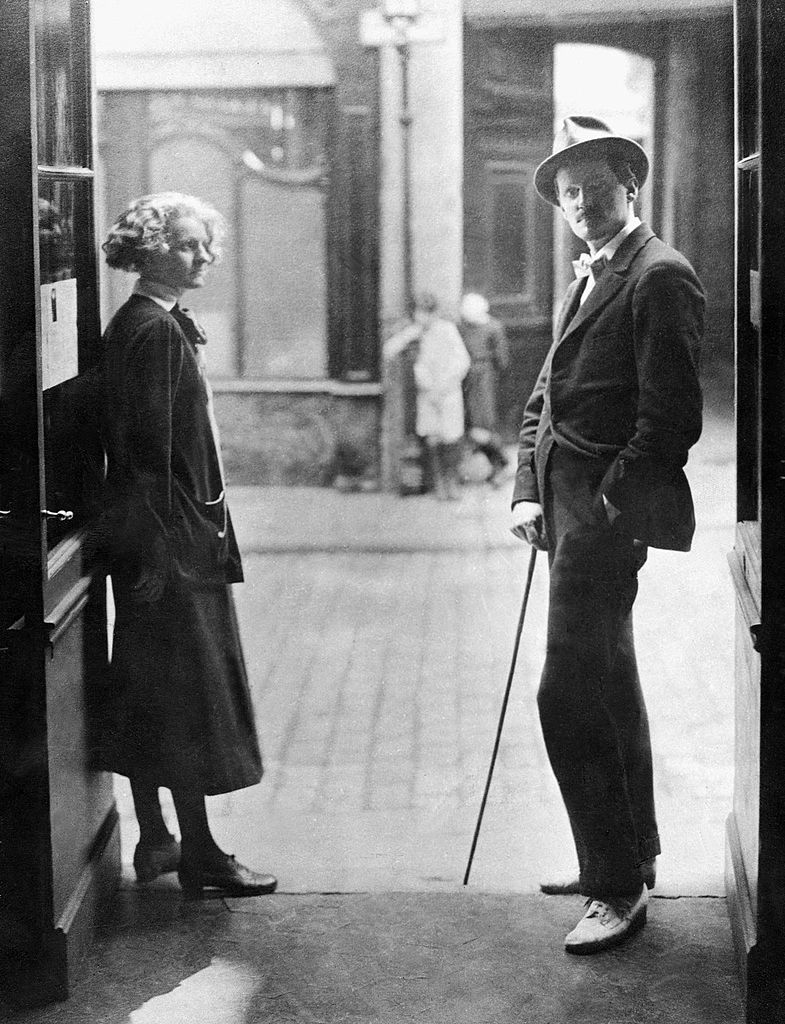
Sylvia Beach in the doorway of her Paris bookshop Shakespeare and Company.
Herein the introduction to “Sylvia Beach and the Lost Generation” published by W.W. Norton in 1983 by Noel Riley Fitch.
GUEST BLOG / By Noel Riley Fitch—My loves were Adrienne Monnier and James Joyce and Shakespeare and Company [bookstore in Paris],” proclaims Sylvia Beach. This book is the story of these three loves.
The first is the story of the loves between two women.
The details were and still are little known. The story began in Paris on a cold, gusty March afternoon in 1917. A shy young American woman named Sylvia Beach hesitated at the door of a Left Bank bookshop and lending library. The owner, a self-assured young French writer and publisher named Adrienne Monnier, got up quickly from her desk and drew her visitor into the shop, greeting her warmly. The two talked the afternoon away, each declaring love for the language and literature of the other.
As Sylvia Beach left [that day] with a library membership card, a gust of wind blew her broad Spanish hat from her head and set it down in the middle of the Rue de L’Odeon. Adrienne Monnier ran to retrieve it, brushed it off, and returned it to her new friend.
 |
| Adrienne Monnier, Rue de L'Odeon, Paris |
When their eyes met, they broke into laughter. They sensed clearly that this meeting was to be the first of many meetings. It proved to be more than that: the opening chapter of a literary life together, a life that for 38 years nurtured two generations of American, English and French writers.
The second story is that of the love of a woman for a man’s genius. Like the first, it began in Paris—but on a hot summer afternoon three years later. At a dinner party, Sylvia Beach spied the author of A Portrait of the Artist as a Young Man drooping in the corner between two bookcases. Trembling, she approached and asked,
“Is this the great James Joyce?”
“James Joyce,” he replied.
They shook hands and, as she tells it, “he put his limp, boneless hand in my tough little paw—if you can call that a handshake.” With this simple exchange, Sylvia Beach, since 1919 the owner of her own bookshop and lending library—Shakespeare and Company—met her literary god.
“I worshipped James Joyce,” she confesses. Like most gods, he did not return her love. Even so, she published Ulysses, one of the longest modern novels, and devoted 12 trying years to his often selfish wants and needs. The loyal supplicant worked feverishly to publish and promote the genius of her remote beloved, whom Tom Stoppard ( in Travasties) ironically but accurately characterizes as an “essentially private man who wishes his total indifference to public notice to be universally recognized.”
Together, he plotting each move from backstage and she working openly in the public arena, they fiercely peddled his epic novel. They were the most successful clandestine promotional team in the history of high art.
The story of Sylvia Beach’s love for Shakespeare and Company supplies the lifeblood of this book.
It began in Paris in November 1919.
For more than two protean decades, the Company there forgathered altered the course of modern literature.
Sylvia Beach created a literary center that magnetically attracted artists from all over the world during what Archibald MacLeish calls the “greatest period of literary and artistic innovation since the Renaissance.”
This Company, no less than that of Chaucer, comprised a diverse array of modern pilgrims:
--T.S. Eliot,
--Andre Gide,
--Ernest Hemingway,
--Ezra Pound,
--Gertrude Stein,
--Paul Valery,
--Samuel Beckett
--Elizabeth Bishop,
--Andre Chamson,
--Malcolm Cowley,
--Leon Edel,
--Janet Flanner,
--Archibald MacLeish,
--Virgil Thomson,
--Glenway Wescott
--Thornton Wilder.
Many of these lights generously tapped their memories so that these tales might be told in full.
These literary pilgrims (the term was Sylvia’s) were not, in a personal or artistic sense, a “lost” generation.
Sylvia and Adrienne and Joyce and the Company they kept were not wanderers but seekers.
Like true pilgrims, they were in quest of salvation.
Shakespeare and Company was their house of worship, consecrated to the cult of art which was their uncommon bond of faith.
--Noel Riley Fitch, 1983.
 |
| Sylvia Beach and James Joyce in the doorway of Shakespeare & Company's original bookshop, Paris. |
No comments:
Post a Comment